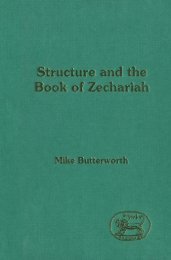Appendix CASE ONE - Collection Point® | The Total Digital Asset ...
Appendix CASE ONE - Collection Point® | The Total Digital Asset ...
Appendix CASE ONE - Collection Point® | The Total Digital Asset ...
You also want an ePaper? Increase the reach of your titles
YUMPU automatically turns print PDFs into web optimized ePapers that Google loves.
Chapter 8<br />
James Greenshields and the House of Lords:<br />
A Reappraisal<br />
Richard S. Tompson<br />
<strong>The</strong> Greenshields case is a paradox in Anglo-Scottish legal history. Most<br />
modern citations tell us that the case established Scottish appeals to the<br />
House of Lords. That can be disproven by a review of the chronology<br />
of appeals. Yet when we look closely at the case, its aftermath and its<br />
subsequent interpretation there is actually more to be learned about the<br />
connections between the English and Scottish legal systems than the older<br />
view appeared to tell us.<br />
This essay has four parts: the first is a correction of the conventional view;<br />
the second is a description of the case (1709-11); the third is a study of<br />
the surprising aftermath (1711-14); and the fourth is a sketch of how<br />
Greenshields disappeared from legal memory in the eighteenth century, and<br />
how it reappeared and was reinterpreted in the nineteenth and twentieth<br />
centuries.<br />
First, the modern citations. A number of authoritative works tell the same<br />
story. Maurice Bond, in introducing volume nine of <strong>The</strong> Manuscripts of the<br />
House of Lords, said the case 'set the precedent of appeals from Scotland<br />
to the House'. In <strong>The</strong> Oxford Companion to Law, Professor Walker said it<br />
'established the right of the House of Lords to hear appeals from the Court<br />
of Session'. Similar assessments appear in the leading modern texts. 1<br />
<strong>The</strong> correction is not too difficult. Scottish appeals were attempted as early<br />
as 1707. <strong>The</strong> first one heard by the House of Lords was in February 1708, and<br />
the peers made their first order on Scottish appeal procedure in April 1709.<br />
In the case of Brand v. Mackenzie the House ordered that upon receipt of<br />
an appeal 'from any decree given or pronounced in any court in Scotland',<br />
after a respondent had been served notice 'the sentence or decree so appealed<br />
1 <strong>The</strong> Oxford Companion to Law (1980), 540; <strong>The</strong> Manuscripts of the House of Lords, N.S., ix<br />
(rptd. 1965), xxii; see also J.H. Baker, An Introduction to English Legal History, 2nd ed. (1979),<br />
32; D.M. Walker, <strong>The</strong> Scottish Legal System, 5th ed. (Edinburgh, 1981), 127-28; Enid Marshall,<br />
General Principles of Scots Law, 4th ed. (Edinburgh, 1982), 32. For other recent references, see below,<br />
nn.50-54. Baker omits the reference in his third edition (1990).






